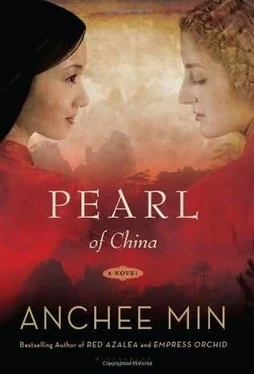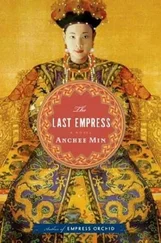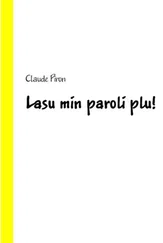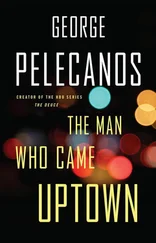Chu was my partner. He hadn’t shit for nine days. I used a chopstick and tried to break the stool and scoop it out with a spoon. But his stool was as hard as a rock. He was in terrible pain. His stomach swelled like a big balloon. Another cellmate was from Shanghai, a doctor. Yesterday he died of constipation. He was only thirty-seven years old.
People here don’t count on waking up when they go to sleep. Strangely, most people die quietly in their sleep. Like the end of a burning candle, the flame flickers and is swallowed by eternal darkness. Each night I think of you. I regret deserting you for Daisy. She reported my complaining to Madame Mao. My foolish pillow talk! Near the end, before I went to prison, she admitted that she was Madame Mao’s spy. I knew Daisy kept a diary, but I didn’t know it would be used as a weapon against me. I thought I was on top of the world when I said to her, “Human beings make mistakes. Mao is a human being. He makes mistakes.” Daisy received a promotion for reporting my comment. Before my arrest, Mao invited me to accompany him to Russia. He made me believe that I was his most trusted man.
There was never a hint that I was to be punished. Then all of a sudden, Madame Mao told me that Mao was upset with me. Next I was stripped of my Party membership. I was to go to prison because I was no longer a comrade but a reactionary. Mao wouldn’t answer my calls or letters.
I know I have hurt you by my disloyalty. I have stayed away as you wished. I am writing this letter because I believe that I won’t last much longer. My belly is larger than a pregnant woman’s. I am chewed up by remorse and shame. I deserve Hell. I don’t expect myself to live beyond the New Year. There is no mail and almost no one gets out alive. In case Chu succeeds in getting out and this letter reaches you, I want you to know that I still love you and have always loved you, even when I was a foolish man.
Dick
My only thought was to see Dick before it was too late. I didn’t bother asking Vanguard for permission to leave because I knew he wouldn’t agree. Rouge bought the ticket, and I left Chin-kiang by train the next day. It was a standing-only ticket because I didn’t have enough money to buy a seat. For the next seventy-two hours, I stood during the day and managed to rest at night, curled up next to urine-soaked newspapers.
After the train, I traveled on foot. It took me two weeks to reach the prison camp. Then they made me wait for days before I was told the truth, that Dick had already died. He had been punished for stealing food. The story was that Dick hadn’t reported the death of another prisoner so that he could claim the dead man’s share of food. Dick slept with the corpse until the stink of rotting flesh gave him away. After that, the prison guards starved Dick and he died.
I wept imagining Dick sleeping with a corpse. I asked that I be allowed to identify Dick’s remains, but I was refused. I went to the prison headquarters and put on a hunger strike. After a week, I was taken to the open graveyard Dick had described in his letter.
As Dick had written, none were buried. Bodies and bones were everywhere. The smell was horrible. I stumbled from body to body looking for my husband. It was almost impossible to recognize any of the dead. I refused to give up. Hours later, I found him. Dick was naked. I recognized him by a scar I remembered. The flesh on his body had been torn by vultures and chewed on by wild dogs.
I fainted. When I woke up, I struggled to remember Dick’s face as I had known him. I did not want to remember him like this. I went and found a local peasant who owned a donkey. I paid him to bring me a bucket of gasoline and some firewood. I borrowed a rusty old shovel and dug a ditch. I dragged what was left of my husband to the ditch and piled the wood on him and poured the gasoline over that. I set this on fire. Afterward, I collected Dick’s bones, but they were too big to fit inside my bag. I had to abandon most of them. I never imagined Dick would end like this.
After I returned to Chin-kiang, Papa performed a memorial for Dick. We invited only the people we trusted who had known Dick. I meant to invite General Chu, but he was nowhere to be found. He had gone into hiding. Papa said that prison life must have made Chu cautious and distrustful. “Let’s remember him as a loyal friend to Dick.”
“What’s important is that Chu risked his life to deliver Father’s letter,” Rouge said.
“God must have guided General Chu,” Papa agreed.
I remembered Chu’s words. He felt blessed to be the messenger because he believed that he would soon join Dick. He believed that finding me would be the best gift he could offer to his friend.
I burned Dick’s writing, which I had saved over the years. Dick would have liked me to do that. He had worshipped Mao and Communism with all his heart. It was what Dick had believed.
I saved Dick’s last letter for Pearl, although I had no idea if we would ever see each other again. A reunion with my friend was becoming harder and harder to imagine. Today’s Chinese children knew Americans only as enemies, and things seemed to be getting worse. I wondered whether Pearl would be amused or horrified at the fact that Mao had considered converting her into a proletarian.
Papa was a master when it came to tricking the authorities. “Mao fought guerrilla style and won China,” Papa said to his congregation. “We stand the same chance to save souls for God if we follow his example.”
I warned Papa that he was asking for trouble.
“I have an advantage over Mao,” Papa replied with confidence. “I have the radio.”
I was worried. “You will end up in prison.”
“That already happened before you came home.” Papa stuck up three fingers. “Three times I was in and out of that filthy place. What more can the authorities do to a century-old man?”
Papa reminded me more and more of Absalom. He attended births, marriages, and funerals. He fooled the government spies with the language he used. He commenced each ceremony the traditional way and then turned it into a Christian event without anyone being the wiser-even when an agent was in the crowd. Papa started each sermon with Mao’s Quotation Book in his hand. He would begin with “We are people from all walks of life” and conclude by reciting from the Bible, “He that had gathered much had nothing over; and he that had gathered little had no lack.”
Papa developed a language only his Christian congregation understood. He referred to God as “the Cloud-walker,” punishment in hell as being “handpicked by Karl Marx,” the Bible as “the Quotation Book,” and salvation as “the revolutionary mission.”
During the celebration on China’s twenty-second National Independence Day, Papa was arrested for the fourth time for spreading poisonous thoughts. Papa confessed quickly to avoid torture. He denounced himself and made promises to the authorities, but he had no intention of keeping them.
He came home quoting a Chinese saying: “A hero is someone who doesn’t swim against the current.”
Papa forgave himself in God’s name. He called his lies strategies to avoid unnecessary sacrifices. Using himself as an example, he taught his congregation how to deal with the authorities. Once, Papa pretended to have a nervous breakdown. He claimed that he suffered flashbacks from the time when he was “poisoned” by Absalom. At public rallies Papa pointed at himself and shouted, “Down with Absalom’s number-one running dog!” This caused stifled laughter to ripple through the crowd.
When ordered to criticize himself, Papa said, “My hands would be busy picking your pockets if Absalom hadn’t introduced me to Jesus Christ.”
Читать дальше












